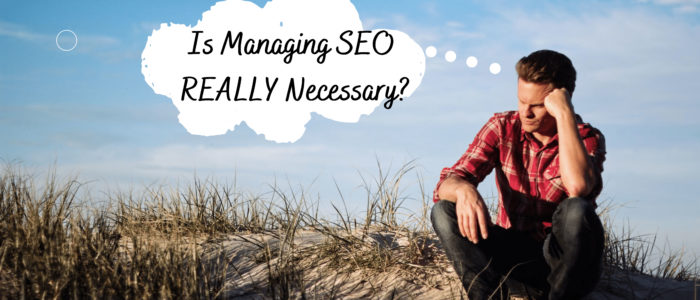
Today, I was initially planning to share a tutorial with you about SEO keyword mapping—one of the most important yet undervalued SEO deliverables. (And yes, I know, we’re getting wild and crazy over here.)
But a recent conversation I had with an SEO doubter got me thinking (which is always scary). Being the SEO-savvy marketer that you are, too, I thought you might also find it intriguing.
An Accidental Email Led to an Interesting Question about the Necessity of SEO
A few weeks ago, I inadvertently sent an email out to several of ya’ll on this email list, thanking you for a purchase that had never actually been made—oops. I was testing an email in one of my sequences and didn’t realize it would send out. (thank you to those of you who gave me a heads up about it).
One marketer who replied to me also shared this in his email:
“I think about SEO frequently, but there is one hump I can’t get over: Is managing SEO really necessary?
My opinion has shifted toward the idea that the most important piece of SEO is to make sure that the text on our Web site contains the text that our potential buyers are using when they search. For that, I feel like the collective experience of our consultants that are interacting with clients each day, and have been doing so in the industry for a decade or two, should be sufficient to inform me of those search phrases.
Am I missing something re: SEO? Is there indeed some advantage to keyword maps, working to get ranked for long-tail keywords, etc., that I’m just not seeing?”
This is so brilliant because I often feel like people are super doubtful about the need to do all this work for SEO and just don’t want to tell me. Many don’t feel it’s worth it. (Shout out to SW for his candid comments, BTW.)
My Response: Proactive SEO vs. Reactive SEO
Here is my response (expanded since I’ve been continuing to think on this question):
Hi SW, I LOVE that you emailed this and I appreciate you being so candid. Here’s what I think. You might be sufficiently informed of those phrases…but are you on Page 1 for them? Are you visible and getting clicks and traffic from those phrases? Using them in the copy alone is not enough to rank prominently for them.
Ensuring the text on your website contains keywords is great, but that is just the tip of the iceberg and part of what I call REACTIVE SEO, as opposed to proactive SEO. Proactive SEO is:
- understanding the alternatives to what they do if they don’t buy from you and addressing that on your site using those keywords
- understanding how to be part of the conversation much earlier when they’re self-educating (not only when they decide to reach out)
- learning what keywords are working for your savvy competitors to drive traffic and how to leverage what they’re doing and one-up them
- Create peripheral content that will bring the right audience to your site, even if the intent is indirect. Still, it positions you as the expert and strengthens your authority with Google in your topical area of choice. Or, creating content off-site on other search engines to improve chances of discovery (YouTube, for example)
- Identifying technical weaknesses and addressing them before they turn into bigger problems (like your technical team changing links or deleting pages and forgetting to use 301 redirects).
- Ensuring you’re applying best practice techniques that Google continues to reward sites for (the latest schema/structured markup, for example)
Reactive SEO only represents a small portion of the value of SEO. SEO truly is so much more than using keywords in your copy.
Why Are You Here?
What do you think? Why are you still here? Do you understand the importance of keeping up SEO activities? Or like SW, are you still wondering why you have to manage SEO at all? Shouldn’t SEO just happen if you’re paying attention to it and using keywords in content thoughtfully?
Hit reply and let me know!
SEO |